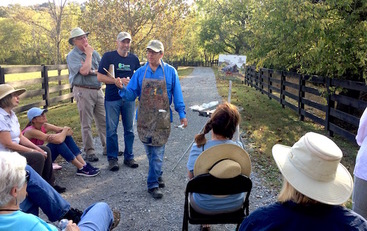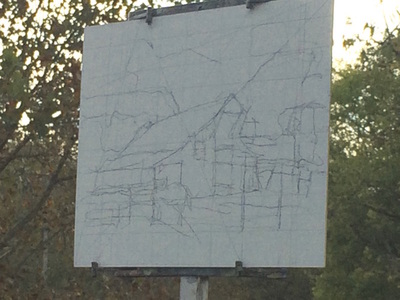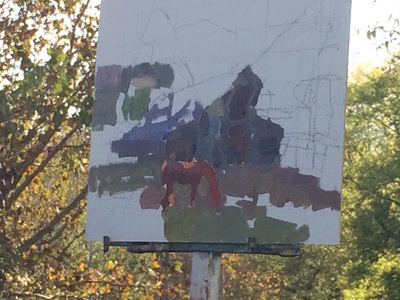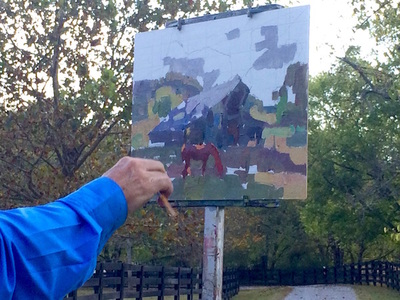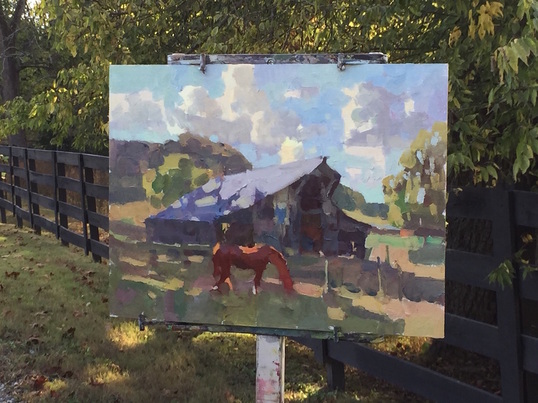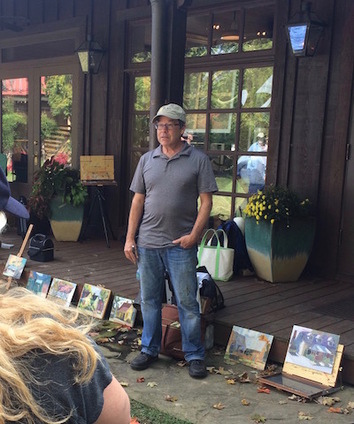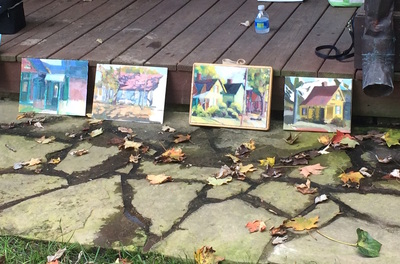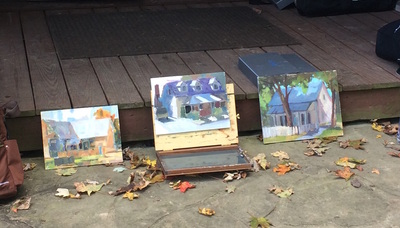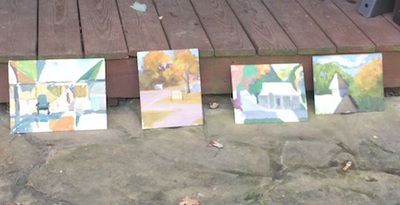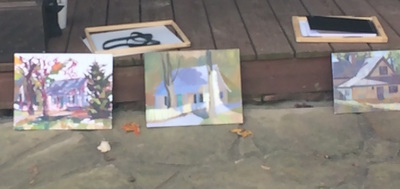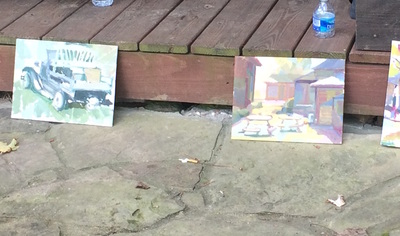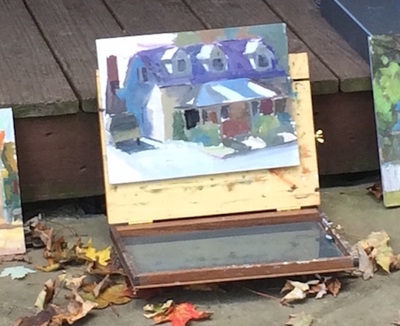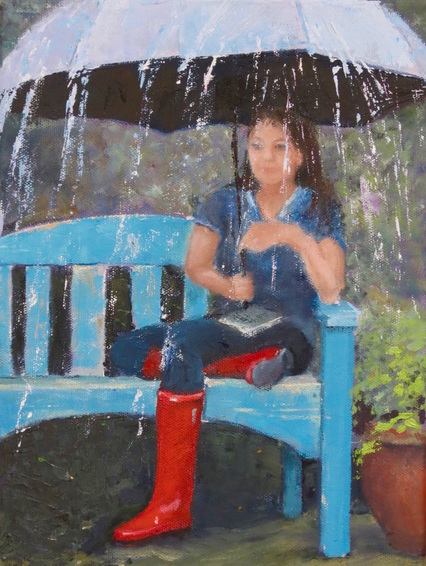|
The previous blog post was about Kevin helping us understand the ins and outs of value (light & dark). Moving on to "shapes"...Kevin Macpherson pretty much exploded our brains as he presented the importance of abstraction in representational painting. His explanation is that irregular, unexpected patterns are pleasing to the human brain, so I found this on the internet: A leading proponent of this theory is V.S. Ramachandran, director of the Center for Brain and Cognition at UC-San Diego and author of The Tell-Tale Brain: A Neuroscientist’s Quest for What Makes Us Human. Ramachandran outlined 10 aesthetic principles that interest or delight the neurons in our visual cortex. One of them, peak shift, describes the way “we find deliberate distortions of a stimulus even more exciting than the stimulus itself.” And this: In an article on peak shift in Psychology Today, Jonah Lehrer describes a study in which subjects could more readily identify famous figures like Richard Nixon by cartoon caricatures than by photographs. The part of the brain recruited for facial recognition, called the fusiform gyrus, excels at interpreting the qualities that distinguish one object from another, to the point where it favors slightly warped representations of reality. Anything to make our paintings more pleasing to the viewer! So Kevin demonstrated some of the ways to keep abstraction within the picture plane:
Kevin used a clever technique of dividing the canvas into completely random geometric shapes and lines and encouraged us to use those as we compose our subject matter to paint. This is a bit hard to explain in a blog so you will have to take one of his workshops sometime! I highly recommend it! (click on photos to read captions)
3 Comments
The few days post-workshop are a lot like jet lag! It's crazy how tired my brain gets and the silly little squabbles my left brain has with my right brain. Art is funny in that way because you really do have to use both the analytical, decision making brain AND the nonverbal, intuitive brain to create a successful painting. So, here I am attempting with words and symbols to create a picture for you, dear readers, of what Kevin, a tremendously successful and very popular American oil painter, taught us last week.
There are three key ingredients that make up a good painting: light & shadow, abstract shapes, and color. Of course, there are about 50 more ingredients that help out, but without these three the results will disappoint. Another word for light & shadow is "value" and the artist uses a value scale of 1-10 to decide how dark or light a particular color mixture is. Squinting is the happy habit of the painter. Try it yourself: take a moment to look at the room you're in, now squint your eyes until what you see is reduced to only dark and light. This is the beginning of a painting composition! It's a very flat plane of abstract light shapes and shadow shapes. Some of the dark that you see are recognizable objects, like a chair or lamp, but you are also seeing the cast shadow and the form shadow of the object which gets included in the overall dark shape. Now it's not a chair. It's an abstract area of dark. If you sketch that shape out on paper and put in the other dark shapes you see in the room, leaving the light areas alone, the result will be a simplified value sketch, a roadmap to follow as you begin your painting. Kevin emphasized how important it is to understand that every color (and there are so many!) in the shadow areas must be painted a darker value than anything that is in the light. Sounds simple, but this is where ms. left brain and ms. right brain wanted to mud wrestle in my head. Not only was SEEING and IDENTIFYING the lightest "shadow" crazy difficult, but REMEMBERING that the lightest color value in the shadow still had to be darker than the darkest color value in the light area. Try saying that to yourself 10 times! We 20 brave students gave our best efforts in the mid-80's autumn sunshine of Tennessee and by our third painting we all passed the bar! This is the way to learn and grow: get out of the zone of comfort, open up and absorb the lessons given! Tomorrow is the first day of three in Kevin Macpherson's oil painting workshop. My car is packed and I am preparing myself to be engaged and present and do all the learning I can. These workshops are HARD, mentally and physically...7 hours a day of taking in information, processing it, and then expressing it back out through the paint, brush and canvas. I try to do one or two every year and slowly, slowly I can see growth in the way I paint. A friend asked me yesterday what I was most hoping to learn. To myself I said "everything", but realistically I most hope to slow my approach in the early stages of a painting so as to get the shapes and lines and values in correctly from the beginning. That will keep the paintings fresh and clean, loose and expressive. I will need a quiet spirit to reach this goal...not give into negative thoughts and panic; yes, panic...I feel it coming on when my brain shuts off and the paint brush starts flying with no clear intention. I have 2 meditations in mind before beginning and whenever the panicky starts: 'The Lord your God is with you, mighty to save. He takes great delight in you, He will quiet you with his love, He will rejoice over you with singing' (Zeph 3) and 'love the Lord your God with all your heart, with all your soul, and with all your mind' (Matt 22) and then just take a moment to be centered and present and grateful for it all. Stay tuned....blog posts of the adventure coming up! Meanwhile...here's a new painting: And also, so excited to announce I've been invited to another fantastic Art Show: The Art Event @ Lipscomb Academy!!!
|
Hello! My name is Wendy and I am passionate about oil painting! Whether in the studio or out in Mother Nature, I get lost in the experience of capturing on canvas the moment and the feel of what I am painting. I pour my love and energy into every single piece of artwork and I hope it shows! This blog is a place where I can use words to talk about art, painting, life, faith, things that make me laugh, and things that inspire. I love every response, so don't be shy about leaving a comment...Archives
June 2024
Categories |
